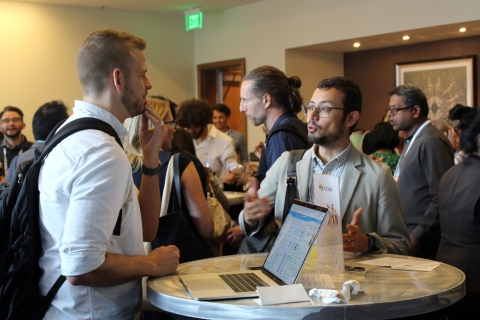
Leaders in news innovation from ProPublica, Project Facet, Media Cloud and more — along with three International Center for Journalists (ICFJ) Knight Fellows — demoed collaborative journalism tools and projects at ICFJ’s “Steal My Tool” event at the recent Online News Association (ONA) conference in Austin, Texas.
Featured projects ranged from a tool that can help verify video in near real-time to an open-source platform for managing the editorial process. Speakers discussed the tools and shared tips during five-minute lightning talks. The goal: to give attendees tools and tips they can use in their newsrooms, inspire new projects and spark collaboration.
“Our goal is to give the audience practical information and useful contacts that they make use of right away in their work,” said ICFJ Director of Innovation Oren Levine, who organized the session with the ICFJ Knight Fellowships Program. “If you start a new project or collaboration using the tools mentioned at the session, send us a tweet about it and mention #StealMyTool or @ICFJ.”
“Steal My Tool” was supported by Airtable, a tool that helps news outlets and other businesses organize content and collaborate across teams.
Here’s a look at the eight tools demoed during the event and how they can be useful for your newsroom:
ICFJ Knight Fellow Justin Arenstein, Code for Africa director, presented GenderGap.AFRICA, a tool designed to help users calculate the gender pay gap across African countries. The project code is available on Github and can be reused to create similar visualizations for other regions.
Emily Boardman Ndulue is a researcher and community manager for Media Cloud, an open-source platform for media analysis. The tool, developed by Harvard University and the Massachusetts Institute of Technology, allows users to explore the attention, influence and framing of issues in the media.
Heather Bryant, founder/director of Project Facet, explained how the open-source platform can help newsrooms seamlessly manage the collaborative editorial process. Each of Project Facet’s collaborative dashboards have interactive task and story lists, as well as space for team discussions around a particular project.
ICFJ Knight Fellow Pedro Burgos talked about fátimabot, which he created with the Brazilian fact-checking group Aos Fatos. Fátimabot finds misinformation spreading online and automatically replies with links to verified news reports. People who have been alerted by fátimabot that they were sharing false stories have corrected their posts and often thanked the bot.
Daniela Gerson, assistant professor of journalism at California State University, Northridge, presented best practices she uses to help improve reporting on immigrant communities. She suggested simple, low-cost tools like Screendoor, TweetDeck, MailChimp and GroundSource to produce compelling immigration storytelling and aggregate news reports from other sources. She is the co-founder of Migratory Notes, a pop-up immigration coverage newsletter.
Rachel Glickhouse is the partner manager for ProPublica’s “Documenting Hate” project, which she showcased at “Steal My Tool.” As part of this project, journalists have collected reliable data on the nature and prevalence of hate crimes and bias incidents across the U.S. “Documenting Hate” is led by ProPublica in collaboration with more than 130 newsrooms with additional civil rights groups, student newsrooms and university partnerships.
ICFJ Knight Fellow Nasr ul Hadi, PROTO partner, demoed tools and storytelling templates for structured journalism, a growing storytelling form in which news stories related to the same topic are each published as an entry in a database. Readers can then slice and dice this data to find insights and patterns.
An Xiao Mina, Meedan’s director of products, shared two platforms, Check and Montage, that help journalists verify news and video collaboratively in near real time. Check played a key role in a number of fact-checking and reporting projects before recent elections in the U.S., Mexico and France. She also discussed how this verification work feeds into the work of the Credibility Coalition, which is developing standards for online content.